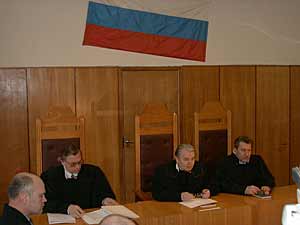The Russian Supreme Court will handle the appeal case of Grigory Pasko on June 25th. Yet, there may still be many rivers to cross before the case is terminated.
When the Russian Supreme Court will handle the appeal case of Grigory Pasko on June 25th, 10 AM, it will be exactly six months since Pasko on Christmas day 2001 was handcuffed in the Pacific Fleet Court and thrown into a solitary cell in the Vladivostok detention centre.
Pasko will not be present at the Supreme Court hearing, in which General-Lieutenant of Justice Yury Parhomchuk will be the presiding judge. In February 2002, the General-Lieutenant, who is known as a man of compromises, rejected a defence request on changing the measure of restraint for Pasko. Thus, Pasko had to stay behind bars.
A remote dream
While the defence seeks a full acquittal, the prosecution demands a more severe sentence than the four years Pasko was convicted to, pointing at the fact that this is eight years below the Russian Penal Code’s minimum sentence for treason through espionage.
As to the outcome of the appeal case, several possibilities exist. If the Supreme Court agrees with the defence that the verdict lacks both a factual and a legal foundation, and that it also is fabricated on the basis of illegally collected ‘evidence’, it may declare that there were no content of crime in Pasko’s actions, terminate the case and order his release.
It could, however, be more likely that it cancels the verdict of the Pacific Fleet Court and sends the case back for a third trial without releasing him. Such an outcome may sound like a farce, but it is well within the limits of the prevailing Russian law.
If the Court, on the other hand, should rule that the verdict of the Pacific Fleet Court is in accordance with the law, Pasko will be transferred to a labour camp in the Russian Far East, where he most likely will serve the rest of his sentence chopping wood. If the sentence is not changed, he will be released on April 25th, 2004.
To complete the picture it should also be mentioned that while the prosecution has the right to appeal any decision that goes in Pasko’s favour to the Presidium of the Supreme Court, Pasko has not the similar right to appeal a decision that goes in his disfavour. So, even if more than four years have passed since Russia ratified the European Convention on Human Rights, the principle of equality of arms still appears like a remote dream.
Once acquitted, twice convicted
Grigory Pasko worked as an investigative journalist for the newspaper of the Russian Pacific Fleet, “Boyevaya Vakhta”. His articles were focusing mainly on nuclear safety issues within the Pacific Fleet. He was arrested by the Russian Security Police (the FSB) on November 20th, 1997, and accused with committing treason through espionage when working with Japanese journalists.
On July 20th, 1999, the Court of the Pacific Fleet acquitted Pasko of the treason charges. Yet, he was sentenced to three years for ‘abuse of his official position’ (a crime he was never charged with) and released under a general amnesty. The Military Collegium of the Russian Supreme Court cancelled the verdict in November 2000 and sent the case back to the Pacific Fleet Court for a re-trial.
The re-trial started on July 11th and ended on December 25th, 2001 with Pasko being convicted to four years for treason through espionage.
The spirit of stalinism
The conviction has created an outrage both inside Russia and internationally. The International Helsinki Federation has engaged itself in the case and Amnesty International who has adopted Pasko as a prisoner of conscience, has characterised the conviction as “motivated by political reprisal for exposing the practice of dumping nuclear waste”.
In February 2002, the European Parliament adopted a resolution where it expresses its concern over the conviction. In late April 2002, the Council of Europe’s Parliamentary Assembly appointed Mr Rudolf Bindig as its rapporteur on the case. At this session Sergei Holovaty, a Ukrainian Parliamentarian who has followed the Pasko-case closely, said that the case shows that the spirit of stalinism still is strong within the Russian legal system.
Also several Russian organisations and individuals, including the speaker of the Upper House of the Russian Parliament, Mr Sergei Mironov, has protested against the verdict.
Russian President, the former FSB-chief, Vladimir Putin, has on the other hand said that not even Pasko’s own lawyers disputed “the fact” that Pasko had transferred secret information to Japanese journalists. The truth is, however, that Pasko was not convicted for transferring any single item of secret information to anybody.
He was acquitted on 97% of the charges brought against him, but convicted for being in the possession of allegedly secret information and for having the “intention” to hand this over to the Japanese media at some later stage. Pasko’s legal team, consisting of lawyers Ivan Pavlov, Genrii Reznik and Anatoly Pishkin and public defender Aleksandr Tkachenko, fiercely disputes these assumptions.




